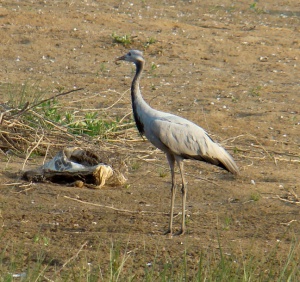(Some minor additions. References updated. Video link) |
Aloktewari (talk | contribs) (Image of a large wintering group) |
||
| Line 16: | Line 16: | ||
==Habitat== | ==Habitat== | ||
Salt lakes, damp marshes, swamps and meadows near water or arid areas if water is closeby. | Salt lakes, damp marshes, swamps and meadows near water or arid areas if water is closeby. | ||
| − | |||
==Behaviour== | ==Behaviour== | ||
====Diet==== | ====Diet==== | ||
| + | [[Image:demoiselle_crane_alok.JPG|thumb|350px|right|Large wintering group in [[India]]<br />Photo by {{user|aloktewari|Alok Tewari}}<br />Jamnagar, Coastal Gujarat, [[India]], January-2016]] | ||
The diet includes seeds, grains and large insects, such as beetles. Lizards and worms are included in the summer months. | The diet includes seeds, grains and large insects, such as beetles. Lizards and worms are included in the summer months. | ||
====Breeding==== | ====Breeding==== | ||
| Line 32: | Line 32: | ||
{{ref}} | {{ref}} | ||
==External Links== | ==External Links== | ||
| + | [[Image:2320.jpg|thumb|300px|right|Juvenile<br />Photo by {{user|Shantilal+Varu|Shantilal Varu}}<br />Kutch, Gujarat, [[India]], November 2011]] | ||
{{GSearch|Crane+virgo}} | {{GSearch|Crane+virgo}} | ||
<br /> | <br /> | ||
Revision as of 15:08, 6 July 2017
- Anthropoides virgo
Grus virgo
Identification
85-100cm (33-39 in)
- Grey white plumage
- Long white neck stripe
- Black marking on foreneck reaching breast
- Red iris
- Black legs
Distribution
Palearctic; winters in north-east Africa and southern Asia
Taxonomy
This is a monotypic species[1].
Habitat
Salt lakes, damp marshes, swamps and meadows near water or arid areas if water is closeby.
Behaviour
Diet
The diet includes seeds, grains and large insects, such as beetles. Lizards and worms are included in the summer months.
Breeding
They nest in a shallow scrape which may be lined with pebbles. The 2 yellowish-green, lavender spotted eggs are incubated by both parents for 27-29 days. The young fledge 55-60 days later.
Vocalisation
Call: loud trumpeting sound.
References
- Clements, J. F., T. S. Schulenberg, M. J. Iliff, D. Roberson, T. A. Fredericks, B. L. Sullivan, and C. L. Wood. 2014. The eBird/Clements checklist of birds of the world: Version 6.9., with updates to August 2014. Downloaded from http://www.birds.cornell.edu/clementschecklist/download/
- Handbook of the Birds of the World Alive (retrieved July 2015)
- Wikipedia
- BirdLife International
- Animal Diversity
Recommended Citation
- BirdForum Opus contributors. (2024) Demoiselle Crane. In: BirdForum, the forum for wild birds and birding. Retrieved 17 May 2024 from https://www.birdforum.net/opus/Demoiselle_Crane
External Links







